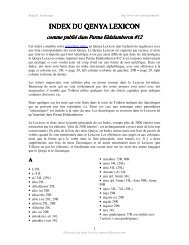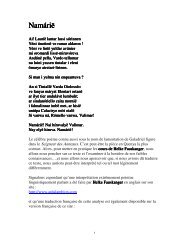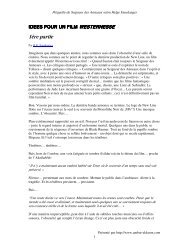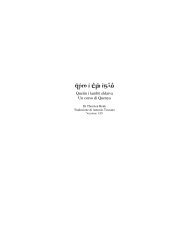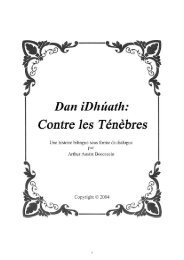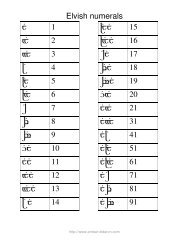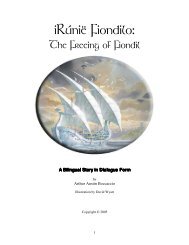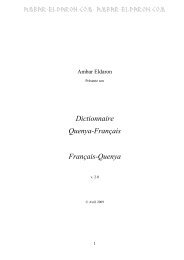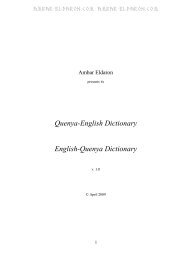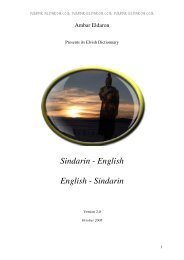Quenya Reverse Wordlist - Ambar Eldaron
Quenya Reverse Wordlist - Ambar Eldaron
Quenya Reverse Wordlist - Ambar Eldaron
You also want an ePaper? Increase the reach of your titles
YUMPU automatically turns print PDFs into web optimized ePapers that Google loves.
Helge K. Fauskanger http://www.uib.no/People/hnohf/<br />
omán námo (2) "a person, somebody"<br />
(PM:340 - use rather quen to avoid confusion with #<br />
1)<br />
omanA Anamo "of doom" in Rithil-<br />
Anamo, q.v. Nominative *anama? or *anan (anam-<br />
)?<br />
omanA-lihtiR Rithil-Anamo "Ring of<br />
Doom", translation of the foreign word Máhanaxar<br />
that was adopted and adapted from Valarin (WJ:401).<br />
Presumably *Risil-Anamo in Exilic <strong>Quenya</strong>.<br />
omayric ciryamo "mariner", nominative and<br />
genitive identical since the noun already ends in -o,<br />
cf. Indis i-Ciryamo "the Mariner's Wife" (UT:8)<br />
omelógni ingólemo "one with very great<br />
knowledge, a 'wizard' ", applied only to great sages of<br />
the Eldar in Valinor, like Rúmil (PM:360)<br />
omilav valimo "happy" (LT1:272; no<br />
adjectives end in -o in mature <strong>Quenya</strong>. Use valin.)<br />
omilúS Súlimo (Þ) surname of Manwe<br />
(wind-god) (THÛ, SA:sûl)<br />
ominaV Vanimo (pl. Vanimor given), "the<br />
beautiful", children of the Valar (BAN), or "fair folk"<br />
= (men and) elves (UGU/UMU)<br />
ominavÚ Úvanimo "monster (creature of<br />
Melko[r]) (BAN, LT1:272); pl. úvanimor "monsters"<br />
(UGU/UMU, (GÛ) )<br />
omiriM #Mirimo pl. Mirimor *"the Free", a<br />
name of the Teleri (MIS)<br />
omitiaM Maitimo "well-shaped one",<br />
mother-name (never used in narrative) of Nelyafinwë<br />
= Maedhros (PM:353)<br />
omitsI #Istimo pl. Istimor *"Wise Ones" =<br />
"Gnomes" (Noldor) (IS)<br />
omlaV Valmo "male Vala" (also Valon)<br />
(LT1:272; these forms may or may not be valid in<br />
mature <strong>Quenya</strong>)<br />
omlin nilmo "friend" (apparently masc.)<br />
(NIL/NDIL)<br />
omlognebmaL #Lambengolmo pl.<br />
Lambengolmor "Loremasters of Tongues", a school<br />
founded by Fëanor (WJ:396)<br />
omlogni ingolmo "loremaster" (WJ:383)<br />
omlon nolmo ("ñ") "wise person" (PM:360)<br />
omlU Ulmo name of the Vala of all waters<br />
(ULU), interpreted "the Pourer" by folk etymology,<br />
but the name was actually adopted and adapted from<br />
Valarin (WJ:400)<br />
omran narmo ("ñ") "wolf" (ÑGAR(A)M;<br />
both the old form ñarmo = *ngarmo and the Third<br />
Age form narmo are given)<br />
omres sermo "friend" (evidently masc.,<br />
since sermë is stated to be fem.) (SER)<br />
omrI Irmo "Desirer", name of a Vala;<br />
normally called Lórien, properly the place where he<br />
dwells (WJ:402)<br />
54<br />
omrocleyT Tyelcormo ("k") "hasty-riser",<br />
mother-name (never used in narrative) of Turcafinwë<br />
= Celegorm (PM:353)<br />
omuar raumo "(noise of a) storm"<br />
(Markirya)<br />
omuruC Curumo *"Cunning One",<br />
"Saruman" (UT:401)<br />
omutoc cotumo ("k") "enemy" (KOT ><br />
KOTH)<br />
on no "under" (NÛ; all other sources give nu<br />
instead. In early "Qenya", no meant "upon"; MC:214)<br />
ón nó (nów-, e.g. pl. nówi) "conception" (=<br />
idea) (NOWO)<br />
onác cáno ("k") "commander", usually as the<br />
title of a lesser chief, especially one acting as the<br />
deputy of one higher in rank (PM:345, SA:káno;<br />
PM:362 indicates that cáno originially meant "crier,<br />
herald"); "ruler, governor, chieftain" (UT:400) Masc.<br />
name Cáno, see Canafinwë<br />
onácret tercáno "herald" (PM:362)<br />
onácedniF Findecáno ("k") *"Haircommander";<br />
Sindarized as Fingon (PM:344)<br />
onácuruT Turucáno ("k") "Turgon"<br />
(PM:344)<br />
onap pano "piece of shaped wood" (PAN)<br />
onapma ampano "building" (especially of<br />
wood), "wooden hall" (PAN)<br />
onáremliS Silmeráno "of silver moon"<br />
(MC:220; this is "Qenya")<br />
onat tano "craftsman, smith" (TAN)<br />
onatnec centano ("k") "potter" (TAN)<br />
onayn nyano (prob. misreading for *nyaro)<br />
"rat" (NYAD)<br />
onimlala alalmino "Elm"-something?<br />
(Narqelion)<br />
onmas samno (Þ) "carpenter, wright,<br />
builder" (STAB)<br />
onmutU Utumno name of the first great<br />
stronghold of Melkor in the North (SA:tum, TUB)<br />
onrev verno "husband" (BES)<br />
onritalah halatirno, also short halatir<br />
(halatirn-, as in dat.sg. halatirnen), "kingsfisher",<br />
etymologically "fish-watcher" (TIR, SKAL 2 , KHAL 1 )<br />
onroht thorno (Þorno) archaic/Vanyarin<br />
form of sorno (Letters:427)<br />
onron norno (1) "oak" (DÓRON)<br />
onroN Norno (2) "dwarf"; a personalized<br />
form of the adjective norna (WJ:413); Nornalië (not<br />
*Nornolië) the "Dwarf-people" as a whole (WJ:388)<br />
onros sorno "eagle" (archaic thorno)<br />
(Letters:427). Also soron. Early "Qenya" has sor,<br />
sornë (LT1:266)<br />
onroto otorno "brother, sworn brother,<br />
[male] associate" (TOR, WÔ). Cf. osellë.<br />
onuat tauno "forest" (LT1:267; mature<br />
<strong>Quenya</strong> taurë)<br />
Presented by http://www.ambar-eldaron.com



